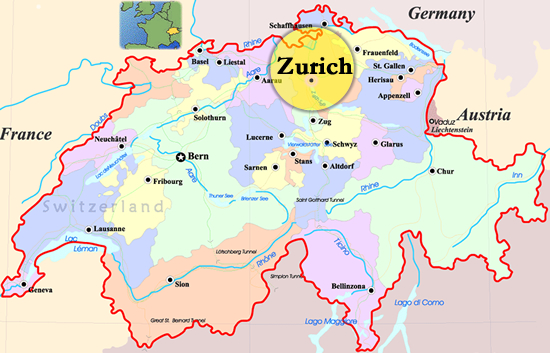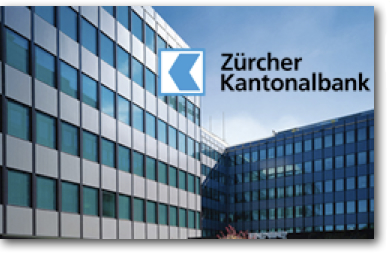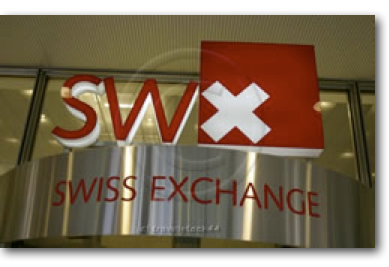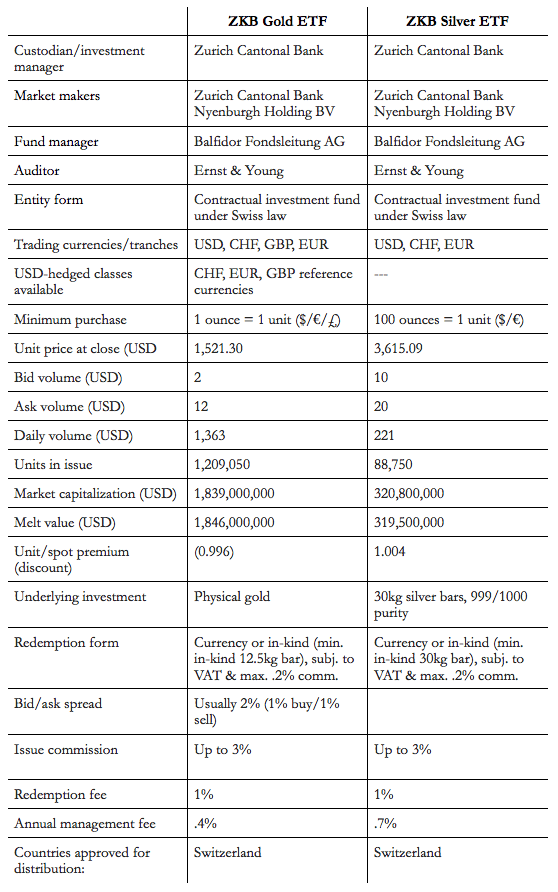
Download a PDF version of this article
By Carolyn A. Betts and Catherine Austin Fitts
In response to our Special Solari Report on the two largest US precious metals exchange-traded funds “GLD & SLV: Disclosure in the Precious Metals Puzzle Palace“, a Solari Report subscriber asked us about two Swiss-based exchange-traded funds offered by the bank of the Swiss canton of Zurich, Zürcher Kantonalbank. Here is our briefing, providing summary information regarding these ETFs and a response as to whether they are available for purchase by US investors.
ZÜRCHER KANTONALBANK AG [German] (ZURICH CANTONAL BANK in English) (Symbol: ZKB)

Zürcher Kantonalbank is the largest Swiss cantonal bank, for the canton of Zurich, and the third largest Swiss bank with assets of 126 billion Swiss francs (CHF) and consolidated net income of 729 million CHF. Cantonal banks in Switzerland are referred to as “independent public-law institutions.” They currently are owned by the cantonal governments and are regulated by the Association of Swiss Cantonal Banks.
The Zurich Cantonal Bank is supervised by the Cantonal Council of Zurich under Zurich’s Cantonal Bank Act. According to ZKB’s website, under Swiss law, the canton of Zurich bears responsibility for all Zürcher Kantonalbank’s liabilities should the bank’s resources prove inadequate. According to Wikipedia, Global Finance Magazine in 2009 rated ZKB one of the five safest banks in the world based upon its AAA/Aaa rating from Standard and Poor’s, Moody’s and Fitch. ZKB has maintained the AAA/Aaa rating as of the date of this article.
ZKB Exchange-Traded Funds

In 2006, ZKB started a gold exchange traded fund, ZKB Gold ETF, which trades on the SIX Swiss Exchange under the symbols ZGLD (Swiss francs), ZGLDUS (US dollars), ZGLDEU (euros) and ZGLDGB (pounds). In 2007, ZKB started a silver ETF, ZKB Silver ETF, which trades under the symbols ZSIL (Swiss francs), ZSILUS (US dollars) and ZSILEU (euros). Currently, both funds trade in tranches denominated in US dollars, Swiss francs and Euros and the gold ETF also trades in pounds and hedged currencies. Both ETFs will allow shareholders to redeem their units in physical metal without limitation. ZKB now also has palladium and platinum ETFs. The ZKB ETFs are established under the Swiss Collective Investment Schemes Act of June 23, 2006 and are approved in Switzerland by the Swiss Financial Market Authority.
Summary information, available for ZKB Gold ETF and for ZKB Silver EFT is as follows as of June 10, 2011:

The prospectus for the ZKB Gold ETF (page 6) describes the organizational structure of this fund as follows:
The ETFs hold currency (US dollars, Swiss francs, euros or pounds sterling, as bank credit balances at sight and on demand with maturities of up to 12 months) in Swiss banks in amounts sufficient to cover projected redemption needs. In order to maintain the investment grade rating, the fund manager of each ETF may take out loans of up to 10% of net assets to pay the 7.6% value –added tax (VAT) payable on the purchase of precious metals, which ultimately is reclaimed in full from the Swiss government.
According to the ETF prospectuses, investment funds in Switzerland have no “legal personality” and thus are not subject to tax on income or capital. Distributions of income (which would, except in the case of fund liquidation, be limited to income on liquid bank investments) are, however, subject to a 35% withholding tax. Capital gains are not subject to withholding in Switzerland, provided they are distributed on a separate coupon. Swiss investors may reclaim deducted withholding taxes on their tax returns. Non-Swiss investors may reclaim withholding tax under the terms of any double taxation agreement between Switzerland and their country of domicile.
Terms sheets for these ETFs can be found for Gold, and for Silver; 2009 prospectuses, including summaries of their respective fund contracts, may be found for Gold; and for Silver.
According to these prospectuses, the ZKB Gold and Silver ETF shares may not be “offered, sold, resold or delivered either directly or indirectly in the United States, to US citizens or persons resident in the United States, or to stock corporations or other legal entities established or organized under the laws of the United States” except in a transaction exempt from US securities laws and such US-domiciled investors may not redeem any shares they hold in exchange for precious metals. This policy was confirmed by a representative of the gold ETF in Switzerland, who was not willing to provide a copy of the prospectus to our US-based attorney due to these limitations.
At least two brokers we talked to in the US told us that purchases of ZKB precious metals ETFs on the Swiss exchange (i.e., in the secondary market) by US domiciled investors are prohibited. At least two other dealers were willing to purchase and hold ZKB ETFs on behalf of our affiliate’s US-domiciled clients. Thus, it appears that a US-domiciled investor may succeed in purchasing ZKB Gold and Silver ETF shares in the secondary market, but he or she will need to rely upon the secondary market for sales and cannot expect to be able to redeem shares for gold or silver.
Authors
Carolyn Betts is an attorney in private practice in Ohio who serves as general counsel to Solari, Inc. and Solari Investment Advisory Services, LLC. Catherine Austin Fitts is the president of Solari, Inc. and Solari Silver & Gold and the managing member of Solari Investment Advisory Services, LLC
